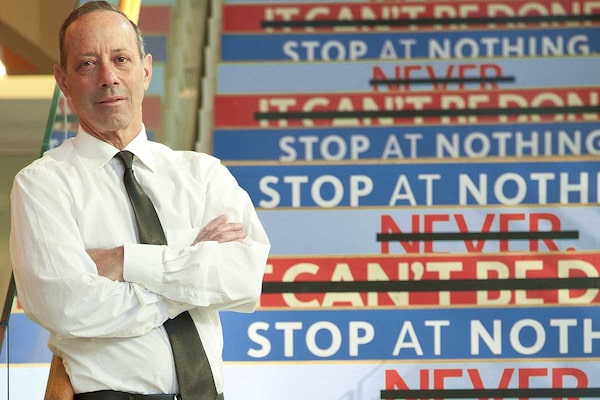
Dr. Jeffrey Zaltzman leads the medical teams at St. Michael’s Hospital who are ushering in a new era of kidney care – and hope for the millions of patients living with kidney diseaseChristoph Strube/SUPPLIED
An interview with Dr. Jeffrey Zaltzman, director of St. Michael’s division of nephrology.
WHY DID YOU CHOOSE TO FOCUS YOUR MEDICAL CAREER ON KIDNEYS?
To me, kidneys are endlessly fascinating. I think people don’t realize just how much they do. Their main job is to filter our blood by removing the body’s waste and excess water. But they also control blood pressure, help produce red blood cells, and control the balance of salt and other electrolytes, in addition to vitamins that maintain bone strength.
It’s amazing. Healthy kidneys filter about 180 litres per day, and reclaim about 99 per cent of the filtered amount so that only the excess waste and fluid are removed. From an evolutionary standpoint, kidneys allow us to survive outside of water.
So when kidneys get damaged, the impact is devastating, because the wastes and toxins begin to accumulate in the body. But if the treatment is right, such as a successful kidney transplant, you can literally change someone’s life.
SINCE YOU STARTED AT ST. MICHAEL’S 25 YEARS AGO, WHAT HAS CHANGED IN TERMS OF TRANSPLANTS?
A lot – thanks to the huge progress we’ve made in anti-rejection medication, the treatment of transplant-related infections, and the technology for monitoring the immune system. It used to be we would transplant only the youngest and healthiest patients. But the success of transplants has allowed us to look after patients whom no one would have imagined transplanting even 15 years ago.
WHAT MAKES THE KIDNEY TRANSPLANT AND CARE CENTRE AT ST. MICHAEL’S DIFFERENT?
We have world specialists right here who are dedicated to a single area of organ research and practice: kidneys. Our patients get the benefit of that unilateral focus.
Our experts are always innovating. In kidney transplantation, for instance, we did the first minimally invasive surgery in Ontario, which means less pain and faster recovery for donors and recipients. We have nephrologists who are world experts in acute kidney injury and renal physiology. All the kidney specialists work together so we all learn from each other’s unique clinical and research perspective. We even have very deep and unique expertise in certain populations – the South Asian community, for instance – who have specific needs when it comes to kidney transplant.
The latest research comes out of our clinic every day, which then informs patient treatment. We studied new anti-rejection medications, like the once-daily tacrolimus, which is now standard care. We’re now developing drug therapies to eliminate organ scarring – a major cause of kidney failure and death. And we’re designing protocols that increase the number of available kidneys.
ORGAN DONATION IS SUCH AN ETHICALLY CHARGED AREA. WHAT’S YOUR TAKE ON IT?
Kidneys are a precious and scarce resource – we never have enough. This is why organ trafficking and transplant tourism exist. There are so many questions. Who should get a kidney first? How do we best allocate them? How do we handle the solicitation of donors?
YOU WERE THE CHIEF MEDICAL OFFICER OF TRILLIUM GIFT OF LIFE, TRANSPLANT. WHAT WAS THAT LIKE?
Trillium is one of the most successful organ donation organizations in North America. I’m so proud that during my tenure we put in place organ donation after “cardio-circulatory death” – in other words, after the heart stops beating. Previously, someone would be considered a viable organ donor only if they died by brain death criteria. St. Mike’s became the first hospital in the country to have a policy of organ transplant after cardiac death. Now it’s applied across the country, which has increased the number of available organs by 33 per cent. St. Michael’s is also one of the top organ donation hospitals in Canada.
WHAT’S NEXT FOR KIDNEY CARE AND TRANSPLANTATION?
I can’t underscore enough that kidney patients are patients for life. I now have a patient on his third transplant – and he’s in his early 50s. He was very young when he first got kidney disease. He will be with us for the rest of his life.
So not only do current patients need life-long care, but there are so many new ones coming in. They all deserve to be comfortable, and to have the utmost privacy, and to have access to state-of-the-art facilities. Our new space will give them that. And it will give our experts the equipment and infrastructure to continually innovate.
Nothing is more important than developing new surgical techniques, new medications and diagnostics for prolonging the kidney transplant survival and the lives of our patients. The new clinic will make it all the more possible to battle this disease.
ST. MICHAEL’S HOSPITAL IS A PIONEERING FORCE IN KIDNEY CARE
- 1ST IN CANADA to perform a kidney auto-transplant using robotic surgery
- 1ST IN CANADA, with Toronto General Hospital, to perform a “kidney swap,” where a living kidney donor who is incompatible with the recipient exchanges kidneys with another incompatible donor/ recipient pair
- 1ST IN ONTARIO to use minimally invasive surgical techniques on living kidney donors
- 1ST IN NORTH AMERICA, and only hospital in Canada, to use technology that allows patients to receive a kidney from a donor with a different blood type
- 1ST IN THE WORLD to use painless photo-acoustic imaging rather than painful needle biopsies to assess the extent of kidney damage
This content was produced by an advertiser. The Globe and Mail was not involved in its creation.